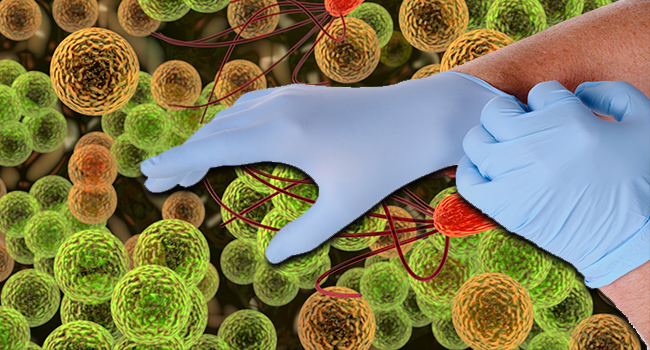
I’ve been writing the first paragraph of this post for half an hour now, and it’s not because I have writer’s block (although I checked Google just to make sure). It’s because many of the beliefs that I’ve held sacred for years have been shattered*. Friends, I come to you today to deliver some terrible news: Gloves in restaurants are actually bad.
If you are surprised by this, know that I am, too. I have always respected the sanctity of the glove. Once, when I saw a cook at Denny’s use the bathroom and not wash his hands (we were there at the same time, I was not just casually creeping) I spoke to the manager, who told me that he’d send the guy back but that it was totally fine. “They all wear gloves in the kitchen,” he had said. “We take food safety very seriously here.” I nodded along and proceeded to eat my 3am dinner, but I was wrong to have done so.
Why? Because it turns out that gloves are actually very good at spreading pathogens. Take Chipotle, for example. It turns out that the company requires all employees wear gloves while working. And that means that the employee (or employees) who contributed to the recent norovirus outbreak must have been wearing gloves while they were preparing food. What happened? Foodbeast spoke to Timothy Fisher, a Fresh Foods Department Manager and Culinary Institute of America (CIA) graduate, and discovered that gloves don’t really cover a whole lotta sins.
“People wearing gloves touch all sorts of things besides food and continue to use the gloves. Technically they should change gloves after they’ve touched anything that isn’t food related, and most health standards say you should also wash your hands before putting on new gloves. But that takes so much time!”
And that time is something employees don’t have, especially when lines are out the door and people will complain about the wait even if it’s for their own good. That’s why you’ll sometimes see a gloved employee at a fast casual restaurant make your food, ring you out, and then go back to making sandwiches while wearing the same gloves. All that’s a problem, and that’s before you factor in the fact that gloves rip, tear, and puncture, leading to the spread of all sorts of bacteria.
And there’s more, per Fisher:
“How many times have you seen someone take their gloves off nearby or over your food? Ever think about how powdery and sweaty their hands are? Ever think about how that glove snapping off is probably spraying micro bits of that person’s sweat and glove powder into your food? If you haven’t you will now.”
Yeah, buddy, I am thinking about it. And it may put me off food forever.
So how do we keep the customers, the employees, and the food safe? By upping hand-washing practices and recognizing that gloves, without the requisite time spent singing Happy Birthday while soaping up one’s palms and digits are just a piece of hygiene theater — comforting, but ultimately useless and possibly dangerous. Unfortunately, too many people now believe that gloves are more important than actual cleansing. And that includes employees, who according to a 2007 CDC study, acknowledged that they didn’t wash or change gloves when they should have — including when they were handling raw meat. In fact, the study notes that food service professionals only washed their hands 27 percent of the time they knew they were supposed to. The study’s 10 years old, but Fisher tells FoodBeast that the culture of uncleanliness has probably only gotten worse from there.
So be careful out there. Maybe make your sandwiches at home while we figure this whole thing out. (But wash your hands. Always wash your hands.)
*Not the ones about the top members of our government being lizard people; those are intact, thank god.






